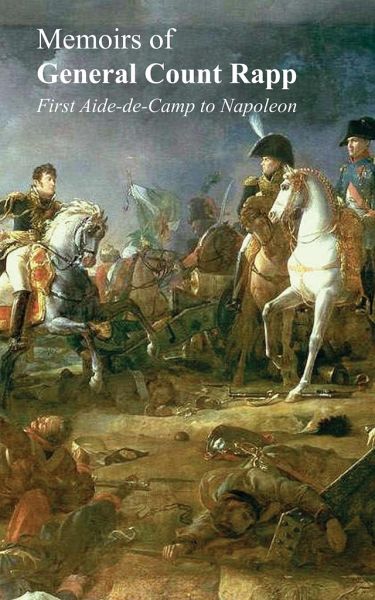
Memoirs of General Count Rappfirst Aide-de-Camp to Napoleon
Versandkostenfrei!
Versandfertig in 1-2 Wochen
24,99 €
inkl. MwSt.

PAYBACK Punkte
12 °P sammeln!
Rapp, General Jean, comte (1771-1821). This much-wounded aide-de-camp of Napoleon was destined as a boy to become a Protestant pastor, but instead joined up in the cavalry in 1788. He was twice wounded in the Army of the Moselle under Hoche in 1793 and was commissioned next year. He was wounded again several times in the Army of the Rhine and was appointed aid to General Desaix. He accompanied him to Egypt, received more wounds, and then returned to France with his general and fought under him at Marengo (1800) where Desaix perished in his arms. The next day he was appointed aide of the First ...
Rapp, General Jean, comte (1771-1821). This much-wounded aide-de-camp of Napoleon was destined as a boy to become a Protestant pastor, but instead joined up in the cavalry in 1788. He was twice wounded in the Army of the Moselle under Hoche in 1793 and was commissioned next year. He was wounded again several times in the Army of the Rhine and was appointed aid to General Desaix. He accompanied him to Egypt, received more wounds, and then returned to France with his general and fought under him at Marengo (1800) where Desaix perished in his arms. The next day he was appointed aide of the First Consul, and in 1801 was charged with raising the Mamelukes of the Guard. In 1803 he was promoted to general de brigad, and in 1805 he capture Prince Repnine at Austerlitz after leading a charge to rout the Russian Imperial Guard, being wounded in the process. In December he was promoted to general de division . A number of governorships followed, but he had at Jena, received a further wound at Golymin, and then became governor of Danzig. Made a count in 1809, he led an attack with Mouton to rescue Boudet's division at Aspern-Esslig. After a period in disfavour for opposing Napoleon's divorce from Josephine, he served in Russia at Smolensk, Borodino (four wounds), Krasnoe, and the Beresina, where he again was wounded. He defended Danzig throughout 1813, surrendered on terms, but was imprisoned in the Ukraine until 1814. During the Hundred Days he rallied to Napoleon and commanded the tiny Army of the Rhine, winning the combat at La Suffel near Stasbourg ten days after Waterloo has been fought. He lay low until 1817, but thereafter held court posts under Louis XVIII before dying of cancer.














